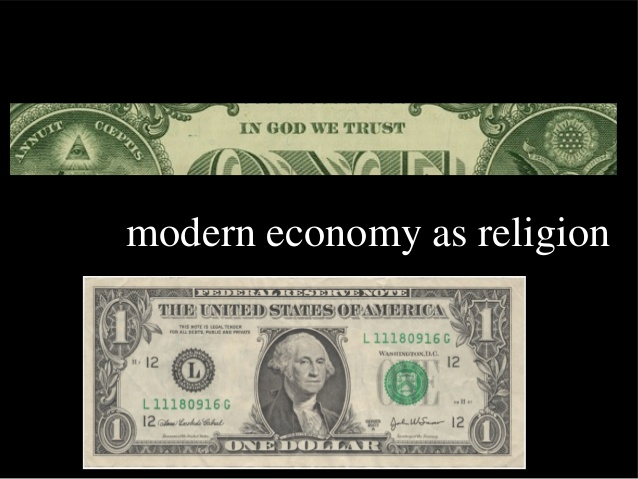A Financial "Religion" - "Economism" Dominates the Earth at Great Price The Church of Economism and Its Discontents
"The economy, in other words, really is Two centuries of explosive economic growth have radically altered our material and ideological worlds. With human activity now the major driver of geological change, the industrial era has come to be called the Anthropocene. This inquiry instead adopts the term Econocene, underscoring its ideological foundation: economism. The concept of economism, the reduction of all social relations to market logic, often appears in critiques of political movements and neoliberal economics. Our concern here is with economism as a widely held system of faith. This modern “religion” is essential for the maintenance of the global market economy, for justifying personal decisions, and for explaining and rationalizing the cosmos we have created...
Economism, by rationalizing market outcomes, Richard Norgaard, "The Church of Economism and Its Discontents," Great Transition Initiative (December 2015), http://www.greattransition.org/publication/the-church-of-economism-and-its-discontents. - See more at: http://www.greattransition.org/publication/the-church-of-economism-and-its-discontents#sthash.8PVAReS0.dpuf |
New Economic NotionsUsing Social Doctrines Expressed by Pope Francis in His Encyclical Hold the Potential to Regenerate the Earth
|
Flaws in Our Current System
Sed ut perspiciatis unde omnis iste natus error sit volupta
21st Century Models
The Cooperative EconomyLorem ipsum dolor sit amet, consectetur adipisicing elit, sed do eiusmod tempor incididunt ut labore et dolore magna aliqua. Ut enim ad minim veniam, quis nostrud exercitation ullamco laboris nisi.
|
Restoring the CommonsLorem ipsum dolor sit amet, consectetur adipisicing elit, sed do eiusmod tempor incididunt ut labore et dolore magna aliqua. Ut enim ad minim veniam, quis nostrud exercitation ullamco laboris nisi.
|








